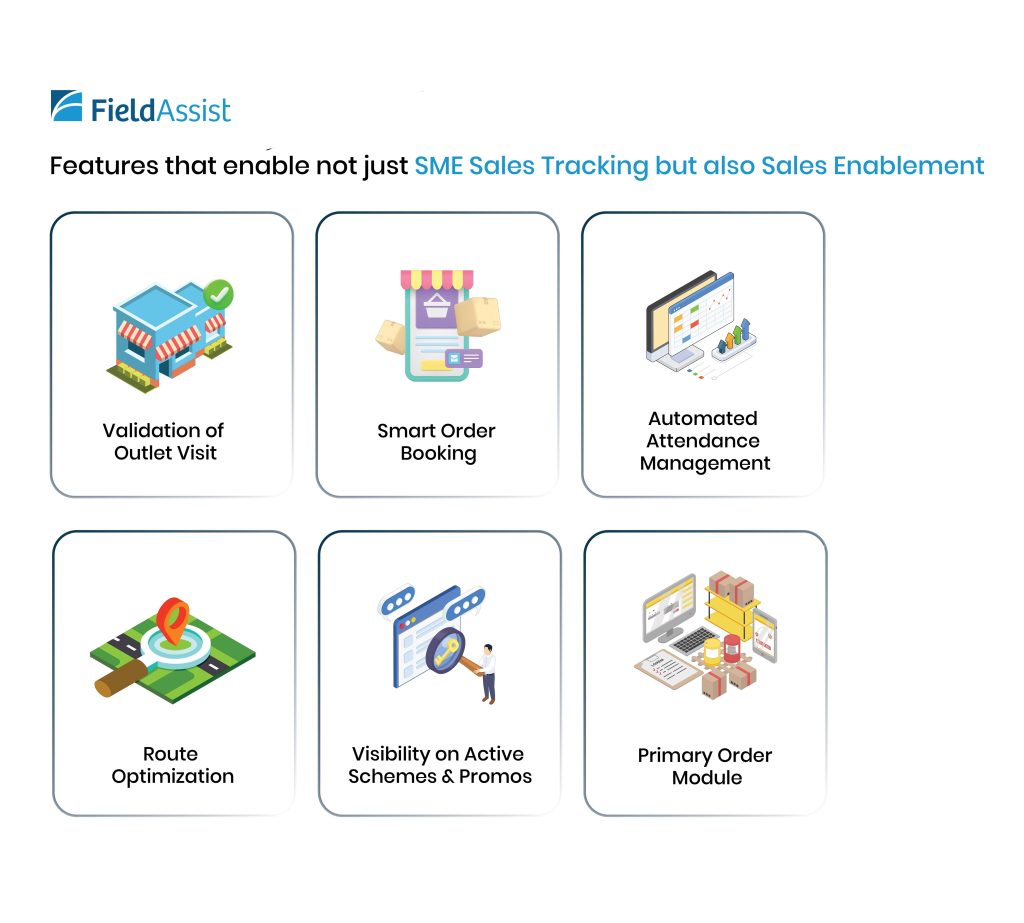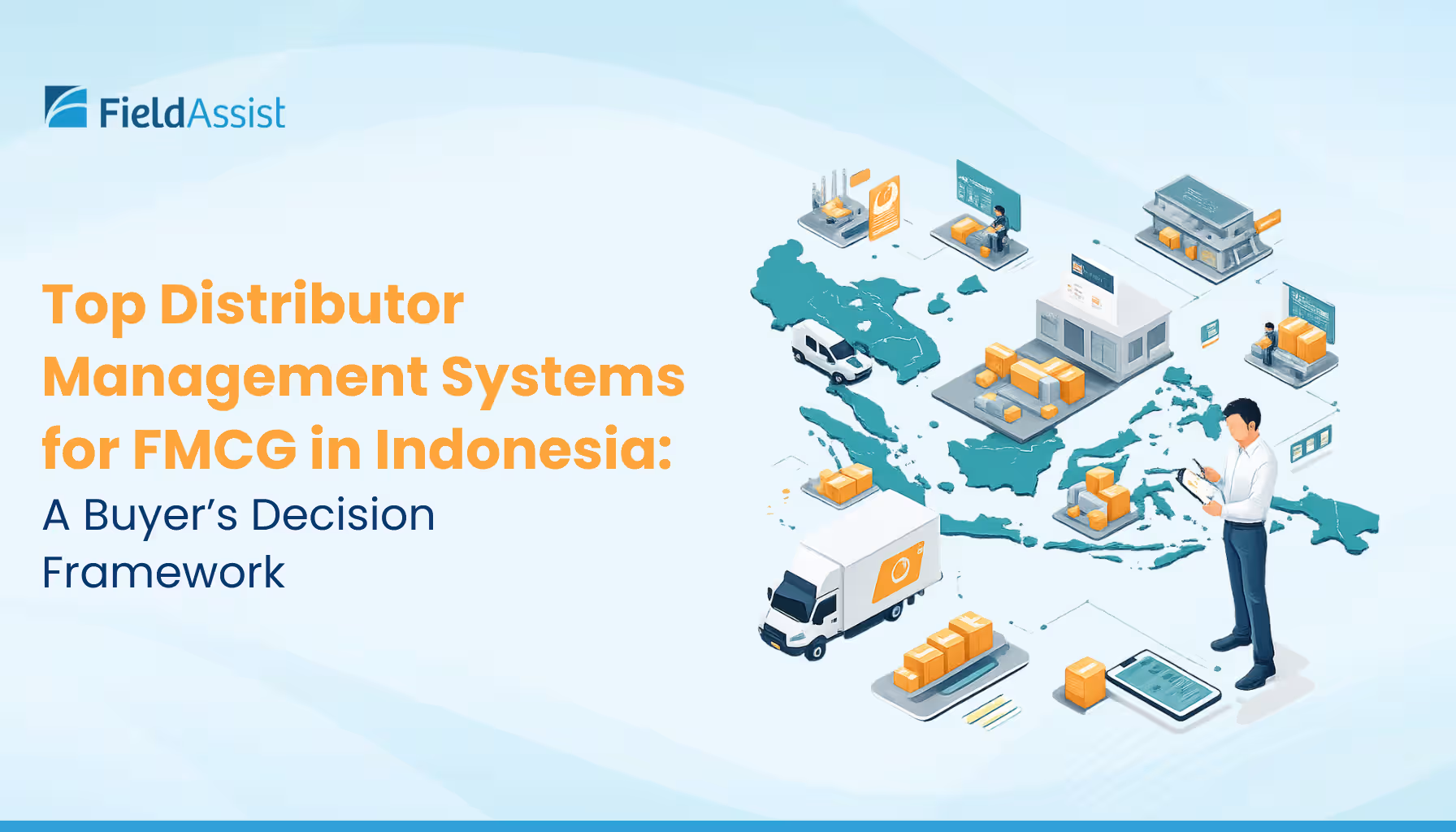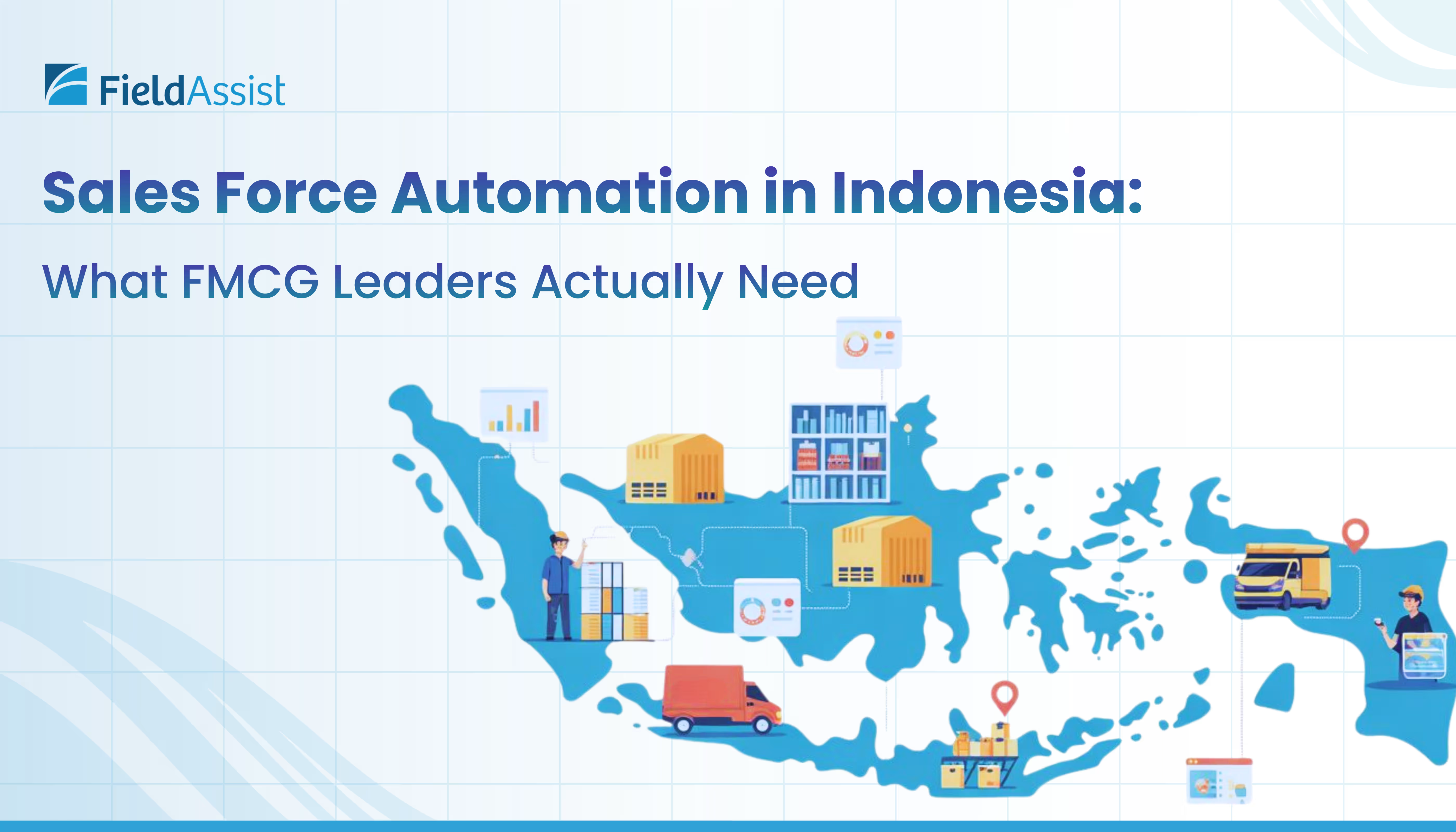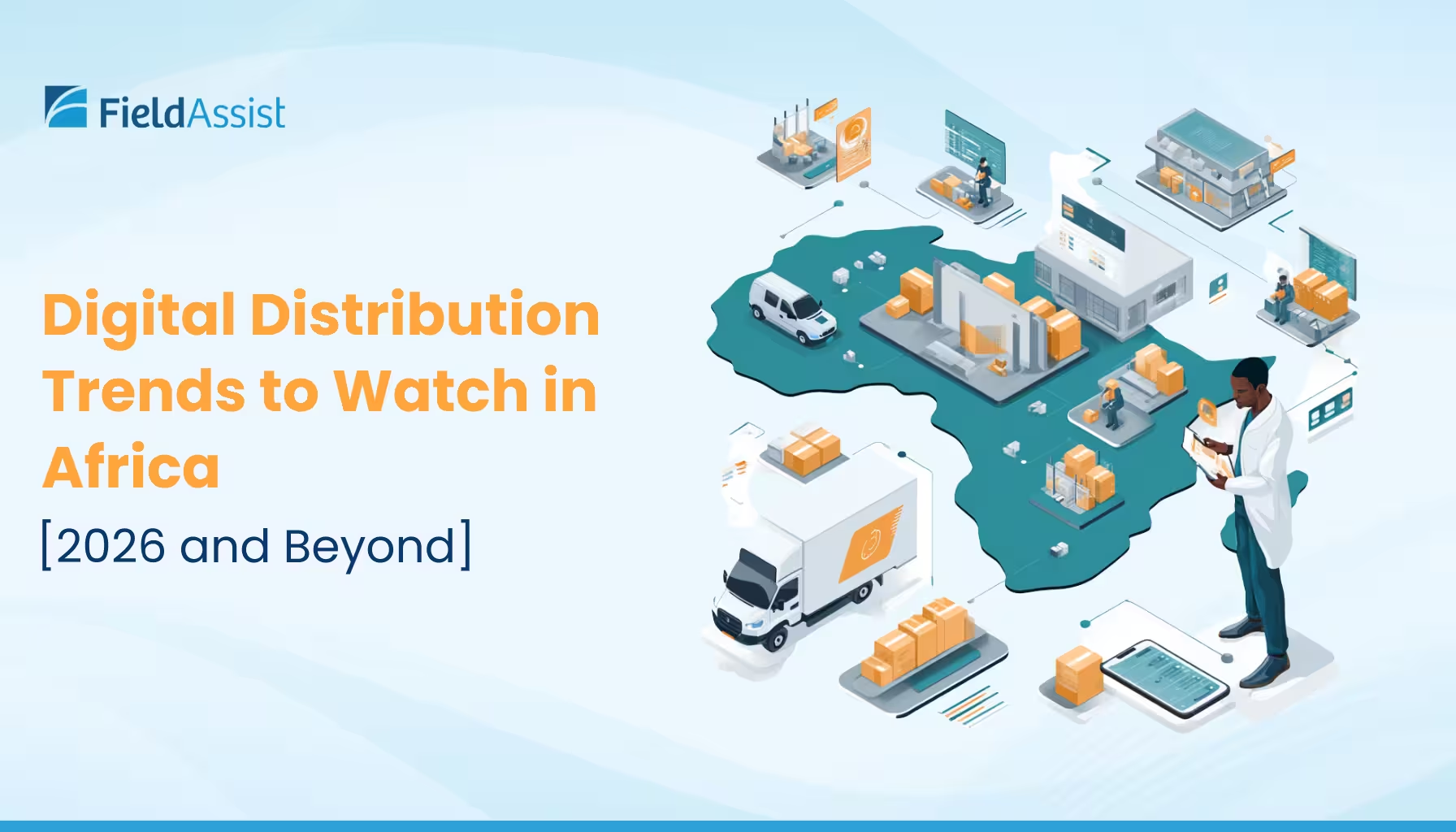Sales Tracker vs Sales Automation: Which is better for SMB’s in 2025?
Discover why you need a sales force tracker. Streamline operations and boost growth with advanced sales tracker software.
In the era of the Digital Economy, the need for a Sales Tracker has increased significantly. Whenever we go to meet customers or attend networking events or conferences, the one question that gets tossed up most of the time is this:
“Can we monitor our salespeople in the field without making them feel that we are tracking their every move?”
Our answer is, “You are tracking activities, not people.”
In 2025, it has become critical for small FMCG businesses and emerging CPG brands to track on-field sales activities. In the past, capturing retailer orders in notebooks was enough, as there wasn’t much competition. But today, especially after 3 seasons of Shark Tank India, all small brands dream of becoming big. Competition has become intense, and brands need real-time clarity on how their products are performing in the retail market. That cannot happen if retail orders continue to be documented in a notebook, and it takes two working days to analyze all that data. This process is also tedious and error-prone.
That’s where a modern field sales tracking software or a field sales tracking app integrated with DMS can truly be a game-changer. With advanced solutions like FieldAssist DMS, brands can move away from old-school documentation and adopt smarter, faster, and more accurate sales reporting powered by a distribution management system software. This type of distribution software ensures accuracy and provides real-time visibility into retail performance, while also centralizing all field data for quick decision-making.
For a founder and sales head of an SMB consumer goods company, using a sales tracker gives them the ability to track sales activities in the field in real-time and centralize the data quickly. Many brands are happy with just a tracker, but is that enough to be competitive? Wouldn’t you rather have a ‘sales enabler’ that not only monitors sales activities but also becomes a ‘source of truth’ to craft your GTM, improve your field performance, and respond to the market dynamics in real-time?
Think of a sales enabler as a dedicated, 24/7 accessible ‘GPS for Sales’. Just the way a GPS helps you navigate from Point A to Point B, a sales enabler, also known as sales force automation software, helps your brand understand where you have been, where you need to reach, and how to get there.
What is Sales Tracking?
In order to assess business performance, identify sales funnel bottlenecks, and make data-driven decisions to meet sales targets, sales tracking is the process of tracking, gathering, and evaluating data from customer contacts and sales activities. Businesses can obtain real-time insights for improved forecasting, more productivity, and higher revenue by documenting information about leads, deals, and customer journeys often with the use of specialized technologies like sales force automation software.
Why is Sales Tracking Important?
- Optimize the Sales Process
By monitoring the sales funnel, businesses can quickly identify bottlenecks where deals often get stuck and take corrective actions. It also shows how sales reps spend their time, helping managers focus on high-impact activities and automate repetitive tasks. Over time, this improves efficiency and increases win rates by replicating strategies that are most effective. Tools like a field sales tracking app make this process faster and more accurate.
- Evaluate Performance & Coaching
Sales tracking highlights top performers who exceed targets and provides insights into their winning techniques. At the same time, it identifies areas where team members are struggling, giving managers the data they need for targeted coaching. With a clear view of performance, managers can also set realistic and ambitious sales goals.
- Improve Business Forecasting
Keeping a record of sales data helps spot seasonal trends, demand fluctuations, and long-term growth patterns. This help businesses to generate reliable and accurate revenue predictions and plan better. Forecasting also supports smarter budgeting and resource allocation—ensuring the right inventory, staffing, and investment decisions are made on time.
- Enhance Customer Understanding
Sales data provides valuable insights into consumer behavior, including purchasing preferences and product demand. These data are used for marketing campaigns, improving offerings, and boosting customer satisfaction. Tracking purchase history also helps identify loyal customers and those at risk of leaving, enabling timely retention efforts like loyalty programs or incentives.
- Increase Collaboration & Communication
Sales insights are useful not only for sales teams but also for marketing, product, and customer service. Sharing this data breaks down silos and aligns strategies across departments. Modern tools such as CRM or field sales CRM for FMCG centralize all customer interactions, while platforms like FieldAssist DMS improve visibility, ensuring teams have access to real-time, accurate information.
Difference Between Sales Tracker and Sales Automation: Which One Do You Need?
Would you choose a Sales Tracker or a Sales Enabler?
A Sales Tracker is a software tool or platform that CPG and FMCG companies use to digitize, monitor, and control sales activities in the field. Typical sales trackers only capture real-time information and offer minimal or no insights into the data collated.
A Sales Enabler is a software solution that automates your sales processes and often uses an AI-powered architecture to provide data-based insights. It could be anything from sales volume, number of outlets visited, active salesmen in the field, categories sold, number of productive outlets, average ticket size, to which territories are selling better, and even red-flagging weak performance areas. AI-powered solutions like the FieldAssist FA App also factor in historical patterns to intelligently suggest smarter routes or improved product assortment. Such sales enablers help businesses understand how well their products are performing in the market, how to improve overall sales performance, and how to capitalize on the latest trends in consumer buying behavior.
Today, many brands actively look for a salesman tracking software in India that not only tracks their team’s activities but also enables smarter sales decisions. Advanced tools, such as sales enablement solutions, bridge the gap between basic tracking and intelligent decision-making, motivates company to stay competitive in this revolving market .
The Need for a Sales Enabler in a Digital World
Quite a few Micro, Small, and Medium (SME) FMCG companies still rely on Excel sheets to capture sales data. In the early days of a company’s evolution, it might suffice. However, in today’s age, when there are more than 12 million retail outlets, and products of 30,000 small and medium FMCG brands cater to 80% of the population, working on old-world technology can prove to be hugely counter-productive.
Here are some of the key features that enable businesses to cultivate a data-driven decision-making culture. Modern tools, such as field sales tracking software and advanced sales enablement solutions, help brands move beyond basic reporting and build smarter, insight-driven sales processes.
Here are some of the key features that empower businesses to create a data-led decision-making culture
Features that enable not just SME Sales Tracking but also Sales Enablement

Validation of Outlet Visit: The geo-fencing feature, available in most salesman tracking software, helps authenticate every outlet visit. It also allows live-tracking of sales reps’ activities throughout the day, such as the number of outlets visited, average time spent per outlet, meetings attended, and leaves taken.
Smart Order Booking: For a fast-growing SMB FMCG brand, not getting the on-field strategy right can make or break the business. A plain sales tracker may let you punch in orders, but a true enabler goes further, allowing faster order booking, nudging salesmen to push relevant categories using historical data, sharing retailer schemes, and even enabling remote order punching via telephonic modules. Solutions like the FA App also sync orders directly with distributors to ensure smooth fulfillment.
Automated Attendance Management: A KRA-based attendance policy creates transparency and minimizes reconciliation issues. Defining KRAs such as “time of first outlet visit” or “total outlets covered” promotes discipline and productivity. Many small FMCG brands across Gujarat, Delhi, and Chennai actively seek this feature when choosing a sales tracker.
Route Optimization: Some advanced sales automation software, like the FieldAssist FA App, helps create customized route plans based on KPIs such as category sales, LPC, and historical data. This not only streamlines daily operations but also supports market expansion plans.
Visibility on Active Schemes & Promos: With a sales force automation app, your field team can activate discounts, coupons, and promotional schemes on the spot to strengthen retailer loyalty and boost conversions.
Primary Order Module: Not all trackers offer this, but it’s a game-changer. It empowers sales reps to place primary orders with distributors directly from the field. For SMB brands in Delhi, Chennai, and Gujarat, this feature has improved inventory visibility and helped transform forecasting into a more precise and proactive process.
Benefits of Using a Sales Enablement Solution for Emerging Companies
Greater Compliance & Productivity: A sales enablement platform keeps a close eye on field activities, such as whether salesmen start their beats on time, the number of outlets visited daily, cross-category selling, and distributor interactions. Tools like a Sales Force Tracker make it easy to monitor productivity and compliance in real time.
Assessing Market Penetration: A basic tracker cannot show the category-wise universe of active retail outlets. A sales enabler, however, provides visibility into active outlets (those placing at least one order in the last three months) across Tier-1 and Tier-2 towns. This helps brands assess penetration region-wise, category-wise, SKU-wise, and revenue-wise.
Improved Sales Performance: By leveraging historical data, sales leaders can identify buying patterns and trends—what products are in demand, where, and when. With this intelligence accessible on a field sales tracking app, sales officers can guide retailers with personalized order recommendations, boosting conversions and efficiency.
Competition Analysis: Advanced sales enablement tools also benchmark your performance against competitors. This lets you identify gaps, spot opportunities, and design strategies to gain an edge in crowded markets.
Forecasting: A strong enabler, like the FieldAssist FA App, offers detailed year-on-year, month-on-month, and quarterly comparisons. These insights support better GTM planning, inventory management, and marketing strategies—helping brands stay ahead with calculated decisions.
Book a Demo for Smart Order Booking
Automated Attendance Management: A KRA-based attendance policy can create transparency for the salespeople in the field and minimize attendance reconciliation issues. E.g. you can define KRAs and workflow policies for your employees such as Total Outlet Visits or Time of First Outlet Visit to encourage higher discipline and productivity. Small manufacturers and emerging brands in Gujarat, Delhi Chennai are very particular about salespeople starting their day on time, hence look for this feature when choosing a sales tracker.
Route Optimization: Some full-suite sales enablement solutions like the FieldAssist FA App, allow you to create customized route plans based on key KPIs such as category sales, LPC, and historical sales so you can drive market expansion plans and optimize each outlet’s serviceability.
Visibility on Active Schemes & Promos: With a salesforce automation app on their smartphone, your on-field sales team can activate schemes, discounts and coupons anytime on the field to build retailer loyalty and ‘stickiness’ in real-time.
Primary Order Module: Not all sales trackers offer this feature, but if you choose one that does, this can be a game-changer. With this, you can empower your sales team to capture or place primary orders with a distributor anytime, anywhere on the field. With access to primary orders, your sales leaders can proactively review inventories to avoid stock dumping or stock-outs. For small manufacturers and emerging brands in Delhi, Chennai, and Gujarat, the primary order module has given them so much visibility on the overall inventory in the market that they have now transformed their inventory planning and forecasting into an art!
Benefits of Using A Sales Enablement Solution for Emerging Companies
- Greater compliance & productivity: Sales Enablement platforms keep a close eye on a salesman’s activities in the field, like starting his beat on time, the number of outlets visited per day, selling across categories, meeting distributors etc.
- Assessing market penetration: A sales tracker does not show you a category-wise universe of the number of active retail outlets in your captive areas. A sales enabler can show you active outlets (that have placed at least 1 order in the past 3 months) of Tier-1 and Tier-2 cities and towns to help you understand how well your products are penetrating the market region-wise, category-wise, revenue-wise, SKU-wise etc.
- Improved sales performance: By analyzing historical data, sales leaders can spot trends and patterns in consumer behaviour as to what products are in demand, when, and where. With this data available on their smartphones, your SOs (sales officers) can help retailers place orders smartly by giving them personalized insights on what to order and how much.
- Competition Analysis: Sales tracking tools with sales enablement capabilities also help you monitor how your brand is performing against competitors and identify places where you can gain a competitive edge.
- Forecasting: A good sales tracker, which has evolved into a sales enabler like the FieldAssist FA App gives you historical data e.g. year-on-year, month-on-month and last 3 months comparisons. This helps brands make calculated decisions about their GTM strategy, inventory management, and marketing strategies.

Conclusion:
Most field sales tracking software today needs an upgrade toward true sales enablement because tracking alone won’t win you the market. The FMCG industry is highly competitive, and data without direction is a wasted effort. What businesses need is an ecosystem that not only tracks but also predicts and guides actions in real time.
With modern tools like a Sales Tracker combined with Salesforce Automation, your sales team can move beyond simple monitoring to driving real growth. A powerful field sales CRM for FMCG empowers salesmen to close more deals, expand coverage, and respond instantly to market changes.
Ready to transform your sales from tracking to enablement?
Want to see what intelligent sales tracker software can do for your business? Contact for demo







